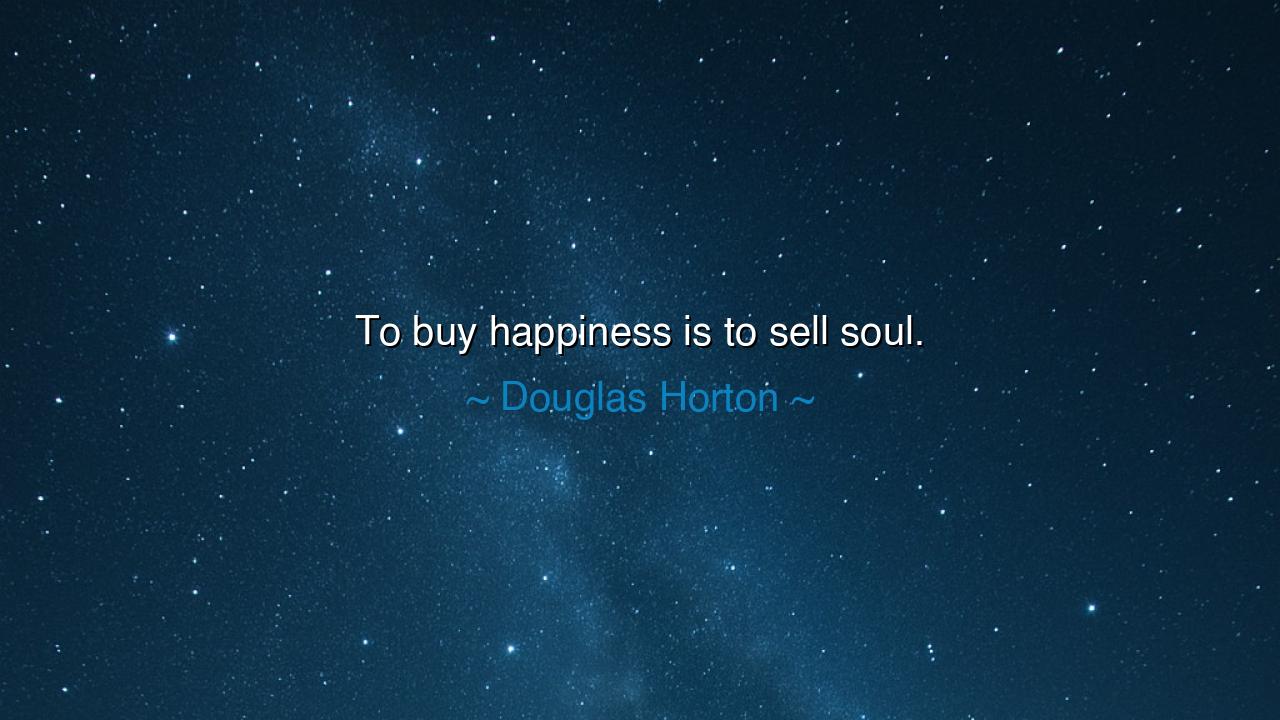
To buy happiness is to sell soul.






In the solemn and piercing words of Douglas Horton, we are confronted with a warning that transcends time: “To buy happiness is to sell soul.” In these few words lies the eternal struggle of humanity — the temptation to exchange the deepest treasures of our spirit for fleeting pleasures, the allure of comfort, wealth, and indulgence in place of virtue, meaning, and inner peace. Horton reminds us that true happiness is not a commodity, nor a thing that can be purchased, but a state of the soul earned through integrity, courage, and the cultivation of inner life. To seek joy by material means alone is to compromise one’s very essence.
The origin of this aphorism lies in Horton’s reflections on the spiritual and moral life. A theologian and preacher, he observed how men and women in society often pursued the illusions of satisfaction: riches, status, and sensual pleasures. These external treasures, he saw, could momentarily gratify the senses, yet they exacted a hidden toll — the surrender of principles, the bending of conscience, and the neglect of the soul’s higher calling. In Horton’s view, when one trades inner integrity for outward gain, one may acquire temporary delight, but it is a happiness hollow and purchased at the cost of the spirit itself.
The meaning of this teaching is as old as the stories of morality and virtue passed down by sages and poets. To “buy happiness” is to treat joy as a commodity, to assume that external wealth or indulgence can substitute for the cultivation of character, the pursuit of knowledge, or the devotion to purpose. It is the path of the short-sighted, who mistake the pleasures of the world for the enduring satisfaction of the heart. Horton warns us: the soul is not for sale, and to trade it for convenience, pleasure, or vanity is to live in deception, bereft of the richness that comes from virtue and conscience.
History offers examples of those who have suffered this peril. Consider King Midas, whose desire for gold led him to wish that all he touched would turn to wealth. He achieved his heart’s desire, yet in that very wish, he found tragedy: his food, his drink, even his beloved daughter became untouchable, turning to cold, lifeless gold. Midas bought the illusion of happiness and paid with the soul’s deepest delight — the love and connection that give life meaning. Horton’s warning mirrors this tale: when happiness is sought in possession rather than principle, the spirit is enslaved, and the joy gained is fleeting and hollow.
Even in the lives of ordinary men and women, the truth resonates. The merchant who cheats to acquire wealth, the socialite who cultivates admiration at the expense of honesty, the worker who sacrifices conscience for higher pay — all experience temporary pleasure, but at a profound cost. Their souls are diminished by compromise, their contentment shallow and fragile. Horton teaches that lasting happiness is inseparable from moral integrity, from the alignment of thought, word, and deed, from a life lived in accordance with enduring truth rather than transient gain.
The philosophical lesson is clear: happiness is earned, not purchased. It is cultivated through virtue, effort, and the courage to act rightly even when the world tempts us otherwise. Wealth and comfort may adorn life, but they cannot create the inner peace and fulfillment that come from honesty, compassion, and purpose. To “sell the soul” is to abandon the very source of joy, replacing depth with superficial delight, substance with glitter, and eternity with the ephemeral.
So, my child, take this wisdom to heart: do not seek to buy your happiness, for any gain that comes at the cost of your soul is no gain at all. Nourish your spirit through acts of courage, love, service, and reflection. Let your joy rise from the richness of character, the strength of conscience, and the beauty of purpose. In doing so, you will find a happiness that cannot be taken from you, a satisfaction that money cannot purchase and the world cannot diminish.
Remember always Horton’s warning: the soul is precious, and to trade it for momentary pleasure is to live in illusion. Happiness, true happiness, belongs only to those who honor their inner life, cultivate virtue, and remain faithful to the principles that give life meaning. Let your deeds reflect your values, your heart resist temptation, and your spirit flourish, for in this, joy becomes eternal and unassailable — the true treasure of a life well-lived.






AAdministratorAdministrator
Welcome, honored guests. Please leave a comment, we will respond soon